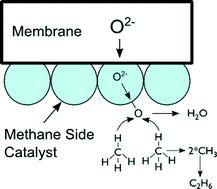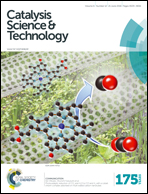Oxidative coupling of methane over mixed oxide catalysts designed for solid oxide membrane reactors
Abstract
Oxidative coupling of methane is a process that converts methane directly to C2 products (ethane and ethylene). One of the problems with the technology is that the selectivity and yield to the desired C2 products is prohibitively low when conventional plug flow reactors are employed. The main reasons for the low C2 selectivity are the thermodynamic and kinetic preference for undesired products (CO and CO2), which are formed through direct methane combustion and sequential ethane and ethylene oxidation. These unselective processes are particularly problematic at high O2 partial pressures (low CH4/O2 ratios). In order to achieve higher C2 selectivity, plug flow membrane reactors, utilizing O2− conducting oxide membranes, can be utilized. The optimal design of a membrane reactor for OCM would, in addition to the membrane, include a catalyst that is active and selective under the relevant operating conditions, and that can be seamlessly integrated with the membrane. In this contribution we have identified and tested several mixed oxide catalysts which could be integrated into a solid oxide membrane reactor. The tested catalysts included lanthanum gallate doped with strontium and magnesium (La0.8Sr0.2Ga0.8Mg0.2O3−δ, LSGM), lanthanum manganite doped with strontium (La0.8Sr0.2MnO3−δ, LSM) and lanthanum strontium cobalt ferrite (La0.8Sr0.2Fe0.8Co0.2O3−δ, LSCF). We show that LSGM and LSGM doped with lithium reached over 90% selectivity to the C2+ products at high CH4/O2 operating ratios which are applicable to membrane reactor designs. We have characterized these materials and discussed the strategies for their integration into a membrane reactor system.


 Please wait while we load your content...
Please wait while we load your content...